Fuxiang Zhang
Skywork-Reward-V2: Scaling Preference Data Curation via Human-AI Synergy
Jul 02, 2025Abstract:Despite the critical role of reward models (RMs) in reinforcement learning from human feedback (RLHF), current state-of-the-art open RMs perform poorly on most existing evaluation benchmarks, failing to capture the spectrum of nuanced and sophisticated human preferences. Even approaches that incorporate advanced training techniques have not yielded meaningful performance improvements. We hypothesize that this brittleness stems primarily from limitations in preference datasets, which are often narrowly scoped, synthetically labeled, or lack rigorous quality control. To address these challenges, we present a large-scale preference dataset comprising 40 million preference pairs, named SynPref-40M. To enable data curation at scale, we design a human-AI synergistic two-stage pipeline that leverages the complementary strengths of human annotation quality and AI scalability. In this pipeline, humans provide verified annotations, while large language models perform automatic curation based on human guidance. Training on this preference mixture, we introduce Skywork-Reward-V2, a suite of eight reward models ranging from 0.6B to 8B parameters, trained on a carefully curated subset of 26 million preference pairs from SynPref-40M. We demonstrate that Skywork-Reward-V2 is versatile across a wide range of capabilities, including alignment with human preferences, objective correctness, safety, resistance to stylistic biases, and best-of-N scaling, achieving state-of-the-art performance across seven major reward model benchmarks. Ablation studies confirm that the effectiveness of our approach stems not only from data scale but also from high-quality curation. The Skywork-Reward-V2 series represents substantial progress in open reward models, highlighting the untapped potential of existing preference datasets and demonstrating how human-AI curation synergy can unlock significantly higher data quality.
Skywork Open Reasoner 1 Technical Report
May 29, 2025Abstract:The success of DeepSeek-R1 underscores the significant role of reinforcement learning (RL) in enhancing the reasoning capabilities of large language models (LLMs). In this work, we present Skywork-OR1, an effective and scalable RL implementation for long Chain-of-Thought (CoT) models. Building on the DeepSeek-R1-Distill model series, our RL approach achieves notable performance gains, increasing average accuracy across AIME24, AIME25, and LiveCodeBench from 57.8% to 72.8% (+15.0%) for the 32B model and from 43.6% to 57.5% (+13.9%) for the 7B model. Our Skywork-OR1-32B model surpasses both DeepSeek-R1 and Qwen3-32B on the AIME24 and AIME25 benchmarks, while achieving comparable results on LiveCodeBench. The Skywork-OR1-7B and Skywork-OR1-Math-7B models demonstrate competitive reasoning capabilities among models of similar size. We perform comprehensive ablation studies on the core components of our training pipeline to validate their effectiveness. Additionally, we thoroughly investigate the phenomenon of entropy collapse, identify key factors affecting entropy dynamics, and demonstrate that mitigating premature entropy collapse is critical for improved test performance. To support community research, we fully open-source our model weights, training code, and training datasets.
Q-Adapter: Training Your LLM Adapter as a Residual Q-Function
Jul 04, 2024Abstract:We consider the problem of adapting Large Language Models (LLMs) pre-trained with Reinforcement Learning from Human Feedback (RLHF) to downstream preference data. Naive approaches to achieve this could be supervised fine-tuning on preferred responses or reinforcement learning with a learned reward model. However, the LLM runs the risk of forgetting its initial knowledge as the fine-tuning progresses. To customize the LLM while preserving its existing capabilities, this paper proposes a novel method, named as Q-Adapter. We start by formalizing LLM adaptation as a problem of maximizing the linear combination of two rewards, one of which corresponds to the reward optimized by the pre-trained LLM and the other to the downstream preference data. Although both rewards are unknown, we show that this can be solved by directly learning a new module from the preference data that approximates the \emph{residual Q-function}. We consider this module to be an adapter because the original pre-trained LLM, together with it, can form the optimal customised LLM. Empirically, experiments on a range of domain-specific tasks and safety alignment tasks illustrate the superiority of Q-Adapter in both anti-forgetting and learning from new preferences.
Improving Sample Efficiency of Reinforcement Learning with Background Knowledge from Large Language Models
Jul 04, 2024



Abstract:Low sample efficiency is an enduring challenge of reinforcement learning (RL). With the advent of versatile large language models (LLMs), recent works impart common-sense knowledge to accelerate policy learning for RL processes. However, we note that such guidance is often tailored for one specific task but loses generalizability. In this paper, we introduce a framework that harnesses LLMs to extract background knowledge of an environment, which contains general understandings of the entire environment, making various downstream RL tasks benefit from one-time knowledge representation. We ground LLMs by feeding a few pre-collected experiences and requesting them to delineate background knowledge of the environment. Afterward, we represent the output knowledge as potential functions for potential-based reward shaping, which has a good property for maintaining policy optimality from task rewards. We instantiate three variants to prompt LLMs for background knowledge, including writing code, annotating preferences, and assigning goals. Our experiments show that these methods achieve significant sample efficiency improvements in a spectrum of downstream tasks from Minigrid and Crafter domains.
Disentangling Policy from Offline Task Representation Learning via Adversarial Data Augmentation
Mar 12, 2024
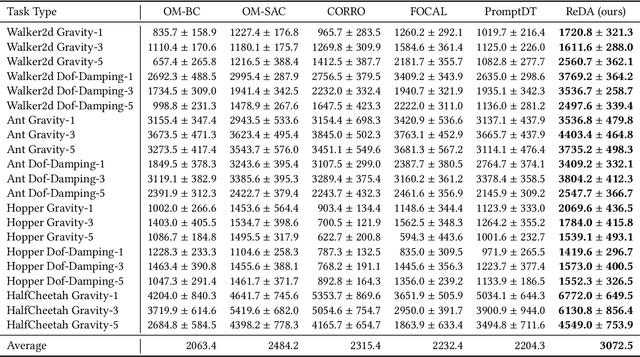
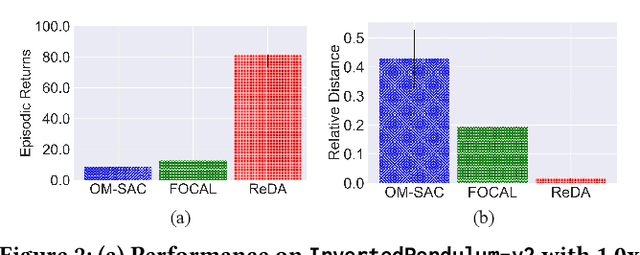
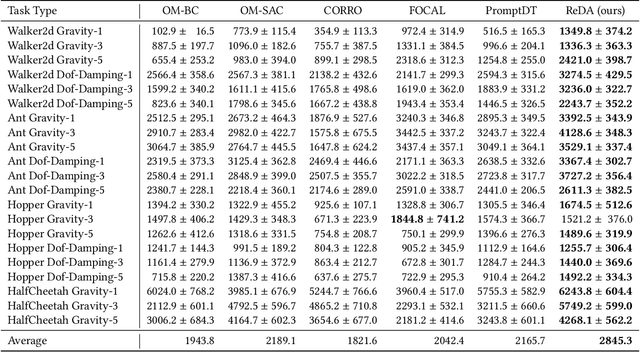
Abstract:Offline meta-reinforcement learning (OMRL) proficiently allows an agent to tackle novel tasks while solely relying on a static dataset. For precise and efficient task identification, existing OMRL research suggests learning separate task representations that be incorporated with policy input, thus forming a context-based meta-policy. A major approach to train task representations is to adopt contrastive learning using multi-task offline data. The dataset typically encompasses interactions from various policies (i.e., the behavior policies), thus providing a plethora of contextual information regarding different tasks. Nonetheless, amassing data from a substantial number of policies is not only impractical but also often unattainable in realistic settings. Instead, we resort to a more constrained yet practical scenario, where multi-task data collection occurs with a limited number of policies. We observed that learned task representations from previous OMRL methods tend to correlate spuriously with the behavior policy instead of reflecting the essential characteristics of the task, resulting in unfavorable out-of-distribution generalization. To alleviate this issue, we introduce a novel algorithm to disentangle the impact of behavior policy from task representation learning through a process called adversarial data augmentation. Specifically, the objective of adversarial data augmentation is not merely to generate data analogous to offline data distribution; instead, it aims to create adversarial examples designed to confound learned task representations and lead to incorrect task identification. Our experiments show that learning from such adversarial samples significantly enhances the robustness and effectiveness of the task identification process and realizes satisfactory out-of-distribution generalization.
Policy Regularization with Dataset Constraint for Offline Reinforcement Learning
Jun 11, 2023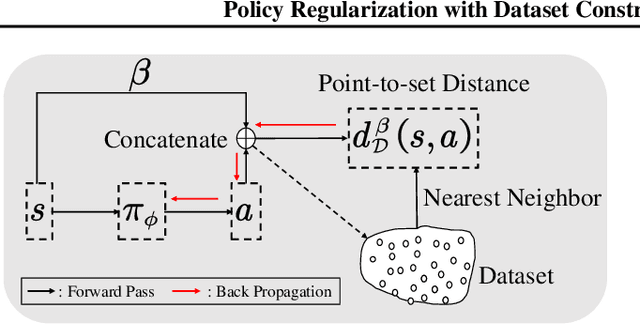
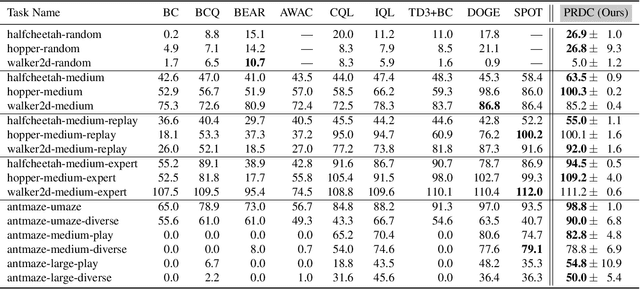
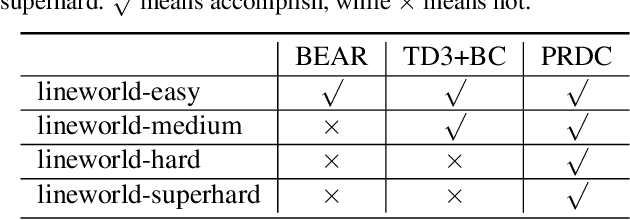
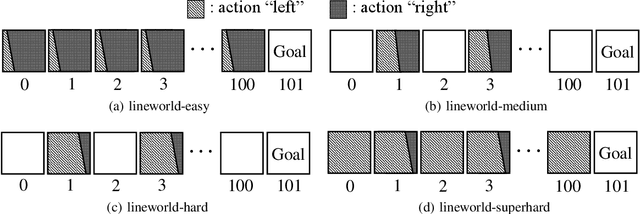
Abstract:We consider the problem of learning the best possible policy from a fixed dataset, known as offline Reinforcement Learning (RL). A common taxonomy of existing offline RL works is policy regularization, which typically constrains the learned policy by distribution or support of the behavior policy. However, distribution and support constraints are overly conservative since they both force the policy to choose similar actions as the behavior policy when considering particular states. It will limit the learned policy's performance, especially when the behavior policy is sub-optimal. In this paper, we find that regularizing the policy towards the nearest state-action pair can be more effective and thus propose Policy Regularization with Dataset Constraint (PRDC). When updating the policy in a given state, PRDC searches the entire dataset for the nearest state-action sample and then restricts the policy with the action of this sample. Unlike previous works, PRDC can guide the policy with proper behaviors from the dataset, allowing it to choose actions that do not appear in the dataset along with the given state. It is a softer constraint but still keeps enough conservatism from out-of-distribution actions. Empirical evidence and theoretical analysis show that PRDC can alleviate offline RL's fundamentally challenging value overestimation issue with a bounded performance gap. Moreover, on a set of locomotion and navigation tasks, PRDC achieves state-of-the-art performance compared with existing methods. Code is available at https://github.com/LAMDA-RL/PRDC
Multi-agent Continual Coordination via Progressive Task Contextualization
May 07, 2023Abstract:Cooperative Multi-agent Reinforcement Learning (MARL) has attracted significant attention and played the potential for many real-world applications. Previous arts mainly focus on facilitating the coordination ability from different aspects (e.g., non-stationarity, credit assignment) in single-task or multi-task scenarios, ignoring the stream of tasks that appear in a continual manner. This ignorance makes the continual coordination an unexplored territory, neither in problem formulation nor efficient algorithms designed. Towards tackling the mentioned issue, this paper proposes an approach Multi-Agent Continual Coordination via Progressive Task Contextualization, dubbed MACPro. The key point lies in obtaining a factorized policy, using shared feature extraction layers but separated independent task heads, each specializing in a specific class of tasks. The task heads can be progressively expanded based on the learned task contextualization. Moreover, to cater to the popular CTDE paradigm in MARL, each agent learns to predict and adopt the most relevant policy head based on local information in a decentralized manner. We show in multiple multi-agent benchmarks that existing continual learning methods fail, while MACPro is able to achieve close-to-optimal performance. More results also disclose the effectiveness of MACPro from multiple aspects like high generalization ability.
 Add to Chrome
Add to Chrome Add to Firefox
Add to Firefox Add to Edge
Add to Edge